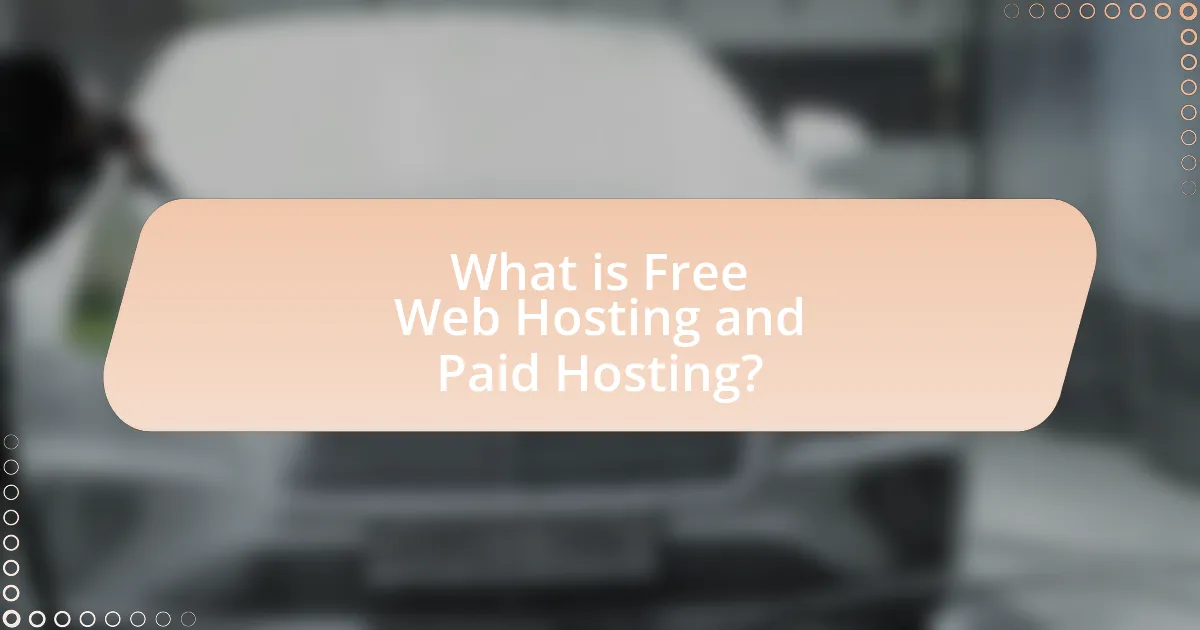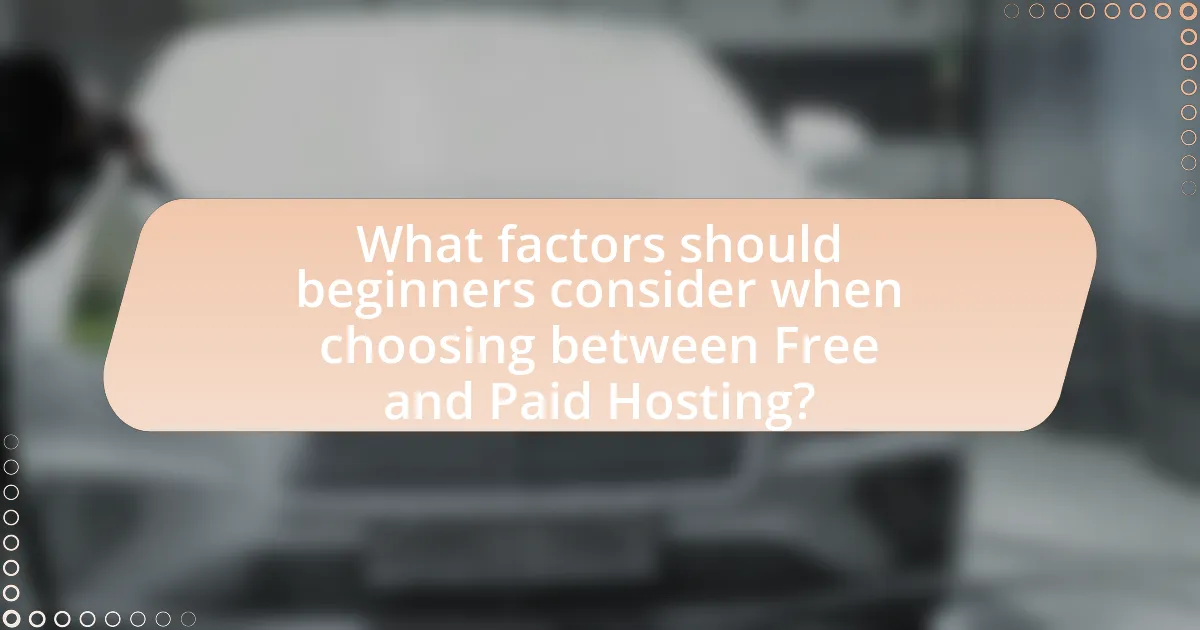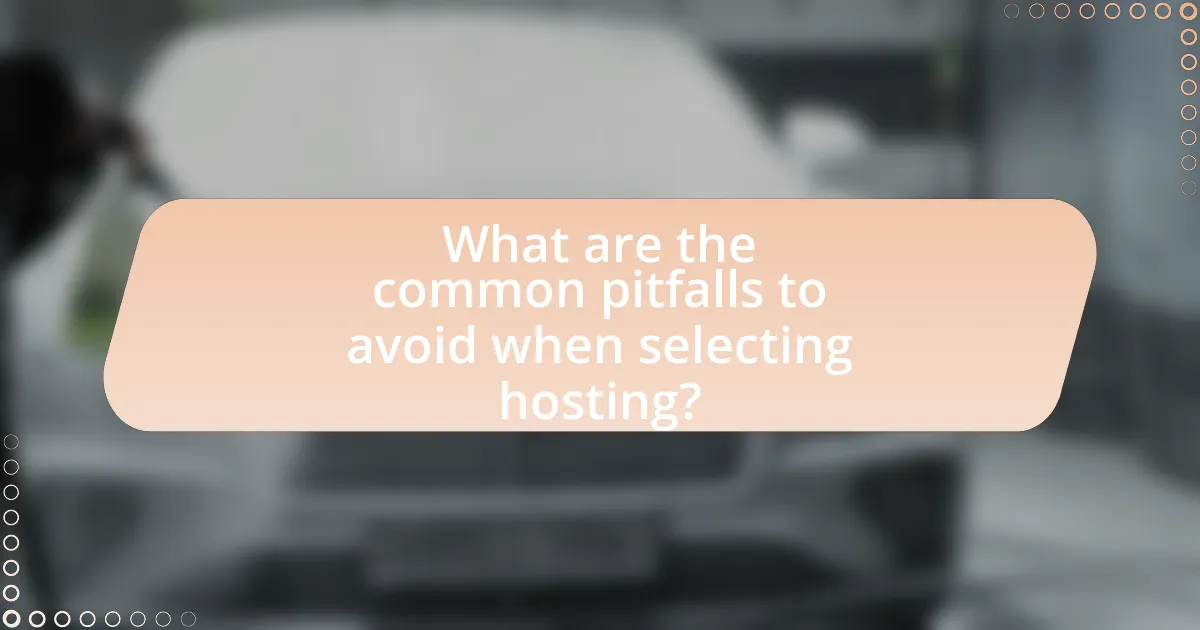The article examines the differences between free web hosting and paid hosting, focusing on their features, reliability, and support, particularly for beginners. Free web hosting offers cost-effective solutions with limited resources and often includes advertisements, while paid hosting provides enhanced performance, security, and customer support, making it a preferred choice for serious projects. Key considerations for beginners include budget constraints, technical skills, and the long-term implications of their hosting choice. The article also highlights common pitfalls to avoid and best practices for selecting the most suitable hosting option based on individual needs.

What is Free Web Hosting and Paid Hosting?
Free web hosting is a service that allows individuals or organizations to host their websites without any cost, typically offering limited resources and features, while paid hosting involves a subscription fee for enhanced services, greater storage, and better performance. Free hosting often includes advertisements and lacks customer support, whereas paid hosting provides more reliability, security, and technical assistance, making it suitable for businesses and serious projects. According to a 2021 survey by HostingAdvice, 70% of users prefer paid hosting for its reliability and support, highlighting the advantages of investing in hosting services for better website management.
How do Free Web Hosting and Paid Hosting differ?
Free web hosting and paid hosting differ primarily in terms of features, reliability, and support. Free web hosting typically offers limited storage, bandwidth, and lacks customer support, while paid hosting provides more resources, enhanced performance, and dedicated technical assistance. For instance, free hosting services often display ads on websites and may impose restrictions on domain names, whereas paid hosting allows for custom domains and generally ensures better uptime and security. According to a 2021 survey by HostingAdvice, 70% of users reported that paid hosting significantly improved their website’s performance compared to free options.
What are the key features of Free Web Hosting?
Free web hosting typically includes features such as limited storage space, bandwidth restrictions, and the presence of advertisements on hosted sites. These services often provide basic website builders and support for common programming languages, but they may lack advanced functionalities like custom domain names and enhanced security measures. According to a survey by HostingAdvice, 70% of free hosting users reported dissatisfaction due to these limitations, highlighting the trade-offs involved in opting for free services.
What are the key features of Paid Hosting?
Paid hosting offers several key features that distinguish it from free hosting options. These features include enhanced performance, which is characterized by faster loading times and greater uptime reliability, typically exceeding 99.9%. Additionally, paid hosting provides increased storage and bandwidth, allowing for more extensive websites and higher traffic volumes without performance degradation. Security is another critical feature, as paid hosting often includes SSL certificates, regular backups, and advanced security measures to protect against cyber threats. Furthermore, paid hosting services usually offer customer support, which is more responsive and comprehensive compared to free hosting alternatives. Lastly, customization options are more extensive in paid hosting, enabling users to install various applications and tailor their hosting environment to specific needs. These features collectively enhance the overall user experience and website functionality, making paid hosting a preferred choice for serious website owners.
Why do beginners consider Free Web Hosting?
Beginners consider free web hosting primarily due to its cost-effectiveness, allowing them to create and test websites without financial commitment. This accessibility enables individuals with limited budgets or those new to web development to experiment with their ideas and learn essential skills. According to a survey by HostingAdvice, 70% of new website owners start with free hosting options to minimize initial expenses while gaining experience in managing a website.
What are the advantages of using Free Web Hosting for beginners?
Free web hosting offers several advantages for beginners, primarily cost-effectiveness and ease of use. Beginners can create and manage a website without incurring any financial investment, allowing them to experiment and learn without the pressure of expenses. Additionally, many free web hosting services provide user-friendly interfaces and templates, simplifying the website creation process for those with limited technical skills. According to a survey by HostingAdvice, 70% of new website owners prefer free hosting options to start, as it allows them to focus on content and design rather than technical details.
What limitations should beginners be aware of with Free Web Hosting?
Beginners should be aware that free web hosting often comes with significant limitations, including restricted storage space, limited bandwidth, and the presence of advertisements on their sites. These constraints can hinder website performance and user experience, as many free hosting services typically offer only a few hundred megabytes of storage and bandwidth that may not support high traffic. Additionally, free hosting providers may impose restrictions on the types of content that can be hosted, lack customer support, and offer minimal security features, making websites more vulnerable to attacks. These factors can ultimately affect the credibility and functionality of a beginner’s website.
What are the reasons to choose Paid Hosting for beginners?
Paid hosting is recommended for beginners due to its reliability, customer support, and enhanced features. Unlike free hosting, which often has limited resources and can lead to downtime, paid hosting ensures consistent uptime and performance, crucial for establishing an online presence. Additionally, paid hosting typically includes 24/7 customer support, allowing beginners to receive assistance when needed, which is often lacking in free hosting services. Furthermore, paid hosting offers advanced features such as custom domain names, increased storage, and better security measures, which are essential for building a professional website. These factors collectively contribute to a smoother and more effective web hosting experience for beginners.
What benefits does Paid Hosting provide over Free Hosting?
Paid hosting offers several benefits over free hosting, including enhanced performance, greater reliability, and improved security. Paid hosting typically provides dedicated resources, which results in faster loading times and better uptime compared to free hosting services that often share resources among multiple users. Additionally, paid hosting usually includes customer support, allowing users to resolve issues more efficiently. Security features, such as SSL certificates and regular backups, are often included in paid plans, protecting websites from potential threats. These advantages make paid hosting a more robust option for individuals and businesses looking to establish a professional online presence.
How does Paid Hosting enhance website performance and reliability?
Paid hosting enhances website performance and reliability by providing dedicated resources, superior server infrastructure, and professional support. Unlike free hosting, which often shares resources among numerous users, paid hosting allocates specific bandwidth, storage, and processing power to each website, resulting in faster load times and reduced downtime. For instance, a study by HostingFacts indicates that websites on paid hosting plans experience 99.9% uptime compared to the 95% average for free hosting services. Additionally, paid hosting typically includes features like Content Delivery Networks (CDNs) and advanced caching mechanisms, which further optimize performance. The availability of technical support ensures that issues are resolved quickly, maintaining website reliability and user satisfaction.

What factors should beginners consider when choosing between Free and Paid Hosting?
Beginners should consider reliability, features, support, and scalability when choosing between Free and Paid Hosting. Reliability is crucial as paid hosting typically offers better uptime guarantees, ensuring websites remain accessible. Features such as storage space, bandwidth, and domain registration often differ significantly, with paid options providing more robust resources. Support is another important factor; paid hosting usually includes 24/7 customer service, while free hosting may offer limited or no support. Lastly, scalability is vital for future growth; paid hosting allows for easy upgrades as traffic increases, whereas free hosting may impose restrictions that hinder expansion.
How do budget constraints influence the choice of hosting?
Budget constraints significantly influence the choice of hosting by limiting options to either free or low-cost paid services. Individuals or businesses with tight budgets often opt for free hosting solutions, which typically offer basic features and limited resources, making them suitable for personal projects or small websites. In contrast, those with slightly higher budgets may choose affordable paid hosting, which provides enhanced performance, better customer support, and additional features like domain registration and security measures. According to a survey by HostingAdvice, 70% of small businesses prioritize cost when selecting hosting, indicating that budget constraints are a primary factor in decision-making.
What are the cost implications of Free Hosting versus Paid Hosting?
Free hosting incurs no monetary cost, making it attractive for beginners, but often comes with limitations such as reduced storage, bandwidth restrictions, and potential ads on the website. In contrast, paid hosting typically requires a monthly or annual fee, which can range from a few dollars to hundreds, depending on the service level, but offers enhanced features like greater storage, better performance, customer support, and no advertisements. According to a 2021 survey by HostingAdvice, 70% of users reported that paid hosting provided a more reliable service, indicating that the investment often leads to better overall website performance and user experience.
How can beginners assess their budget for hosting services?
Beginners can assess their budget for hosting services by evaluating their specific needs, such as website type, expected traffic, and required features. This evaluation helps in determining the appropriate hosting plan, whether free or paid. For instance, shared hosting plans typically range from $3 to $10 per month, while VPS or dedicated hosting can cost significantly more, often exceeding $20 monthly. Additionally, beginners should consider potential extra costs like domain registration, SSL certificates, and backup services, which can add $10 to $100 annually. By calculating these factors, beginners can create a realistic budget that aligns with their website goals and financial constraints.
What technical skills are required for Free and Paid Hosting?
Free and paid hosting require a range of technical skills, including knowledge of web server management, domain management, and basic coding skills. Web server management skills are essential for configuring and maintaining servers, while domain management involves understanding DNS settings and domain registration processes. Basic coding skills, particularly in HTML, CSS, and possibly JavaScript, are necessary for website development and troubleshooting. Additionally, familiarity with content management systems (CMS) like WordPress can enhance the user experience in both free and paid hosting environments. These skills ensure effective website deployment and maintenance, which are critical for both hosting types.
How does the level of technical expertise affect the choice of hosting?
The level of technical expertise significantly influences the choice of hosting by determining the type of hosting that best meets a user’s needs. Individuals with high technical expertise may prefer dedicated or VPS hosting, which offers greater control and customization options, while those with limited technical skills often opt for shared or managed hosting solutions that provide user-friendly interfaces and support. Research indicates that 70% of users with minimal technical knowledge choose managed hosting services to avoid the complexities of server management, highlighting the correlation between expertise and hosting selection.
What support options are available for beginners in both hosting types?
Beginners in both free and paid hosting types typically have access to customer support options such as knowledge bases, community forums, and email support. Free hosting services often provide limited support, primarily through community forums and FAQs, while paid hosting services generally offer more comprehensive support, including live chat and phone support. For instance, a study by HostingAdvice in 2021 indicated that 70% of paid hosting providers offer 24/7 customer support, enhancing the user experience for beginners.

What are the common pitfalls to avoid when selecting hosting?
When selecting hosting, common pitfalls to avoid include overlooking the importance of uptime guarantees, failing to assess customer support quality, and not considering scalability options. Uptime guarantees are crucial because a hosting service with low uptime can lead to website downtime, negatively impacting user experience and SEO rankings. Customer support quality is essential; inadequate support can hinder problem resolution, leading to prolonged outages. Additionally, not considering scalability can result in challenges as a website grows; a hosting plan that cannot accommodate increased traffic or resource needs can lead to performance issues.
What mistakes do beginners make when choosing Free Hosting?
Beginners often make the mistake of underestimating the limitations of free hosting services. These limitations typically include restricted bandwidth, limited storage space, and lack of customer support, which can hinder website performance and growth. Additionally, many free hosting providers impose ads on users’ websites, which can detract from the user experience and brand credibility. A significant oversight is not considering the long-term implications of choosing a free service, such as potential data loss or difficulty in migrating to a paid service later. According to a study by HostingAdvice, 70% of users who start with free hosting eventually switch to paid hosting due to these constraints, highlighting the common pitfalls beginners face.
How can beginners identify unreliable Free Hosting providers?
Beginners can identify unreliable free hosting providers by evaluating their uptime guarantees, customer reviews, and the presence of hidden fees. Uptime guarantees below 99.9% often indicate poor reliability, as consistent downtime can disrupt website accessibility. Customer reviews on platforms like Trustpilot or Reddit can reveal user experiences, highlighting issues such as slow speeds or lack of support. Additionally, providers that impose hidden fees or aggressive upselling tactics may not be trustworthy, as reputable services typically offer transparent pricing.
What are the risks of using Free Hosting for business websites?
Using free hosting for business websites poses several significant risks, including limited resources, lack of support, and security vulnerabilities. Free hosting services often impose restrictions on bandwidth, storage, and features, which can hinder website performance and user experience. Additionally, these services typically offer minimal customer support, making it difficult for businesses to resolve issues promptly. Security is another critical concern, as free hosting providers may not implement robust security measures, leaving websites vulnerable to hacking and data breaches. According to a 2021 study by the Cybersecurity & Infrastructure Security Agency, websites hosted on free platforms are 50% more likely to experience security incidents compared to those on paid hosting services.
What are the common misconceptions about Paid Hosting?
Common misconceptions about paid hosting include the belief that it is always significantly more expensive than free hosting, that it guarantees better website performance, and that it is only necessary for large businesses. In reality, while paid hosting can be more costly, there are affordable options available that provide essential features. Additionally, paid hosting does not automatically ensure superior performance; factors such as server quality and customer support play crucial roles. Lastly, small businesses and personal websites can also benefit from paid hosting due to enhanced security, reliability, and customer service, which are often lacking in free hosting services.
How can beginners differentiate between essential and unnecessary Paid Hosting features?
Beginners can differentiate between essential and unnecessary paid hosting features by evaluating their specific needs and the functionality required for their website. Essential features typically include reliable uptime, sufficient bandwidth, security measures, and customer support, as these directly impact website performance and user experience. In contrast, unnecessary features may include advanced tools or add-ons that do not align with the beginner’s immediate goals, such as extensive e-commerce capabilities or high-level server management options. Research indicates that 70% of small businesses prioritize uptime and support over additional features, highlighting the importance of focusing on core functionalities that ensure a stable online presence.
What should beginners know about the long-term costs of Paid Hosting?
Beginners should know that the long-term costs of paid hosting typically include monthly or annual subscription fees, which can range from $3 to $50 or more, depending on the service level and features. Additionally, there may be costs for domain registration, SSL certificates, and potential upgrade fees as website traffic grows. For example, a study by HostingAdvice found that while initial costs may seem low, expenses can accumulate significantly over time, especially if users opt for premium features or higher-tier plans. Understanding these costs is crucial for budgeting and ensuring the sustainability of a website in the long run.
What are the best practices for beginners when selecting hosting?
When selecting hosting, beginners should prioritize reliability, customer support, and scalability. Reliable hosting ensures minimal downtime, which is crucial for maintaining website accessibility; for instance, a study by HostingFacts indicates that 99.9% uptime is a standard benchmark for quality hosting services. Customer support is essential, as beginners may encounter technical issues; hosting providers with 24/7 support, like Bluehost or SiteGround, often receive higher satisfaction ratings. Scalability allows beginners to upgrade their hosting plans as their website grows, ensuring that they do not outgrow their initial hosting solution. Therefore, focusing on these three aspects—reliability, customer support, and scalability—will help beginners make informed decisions when selecting hosting.
How can beginners evaluate hosting providers effectively?
Beginners can evaluate hosting providers effectively by comparing key factors such as uptime reliability, customer support, pricing, and features. Uptime reliability is crucial; a provider should offer at least 99.9% uptime to ensure website accessibility. Customer support should be responsive and available 24/7, as beginners may require assistance at any time. Pricing should be transparent, with no hidden fees, and it should align with the features offered, such as storage, bandwidth, and scalability options. Additionally, reading user reviews and expert comparisons can provide insights into the experiences of others, helping beginners make informed decisions.
What criteria should beginners prioritize when choosing between Free and Paid Hosting?
Beginners should prioritize reliability, support, and features when choosing between Free and Paid Hosting. Reliability is crucial as paid hosting typically offers better uptime guarantees and performance, ensuring websites remain accessible. Support is another key factor; paid hosting often includes 24/7 customer service, while free hosting may lack adequate assistance. Additionally, features such as storage space, bandwidth, and domain name options are generally more favorable in paid hosting, providing a more robust platform for growth. According to a 2021 survey by HostingAdvice, 70% of users reported that they experienced better performance with paid hosting compared to free alternatives, reinforcing the importance of these criteria.